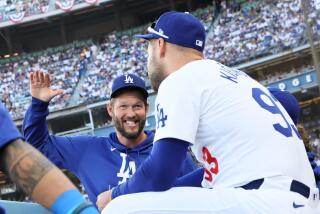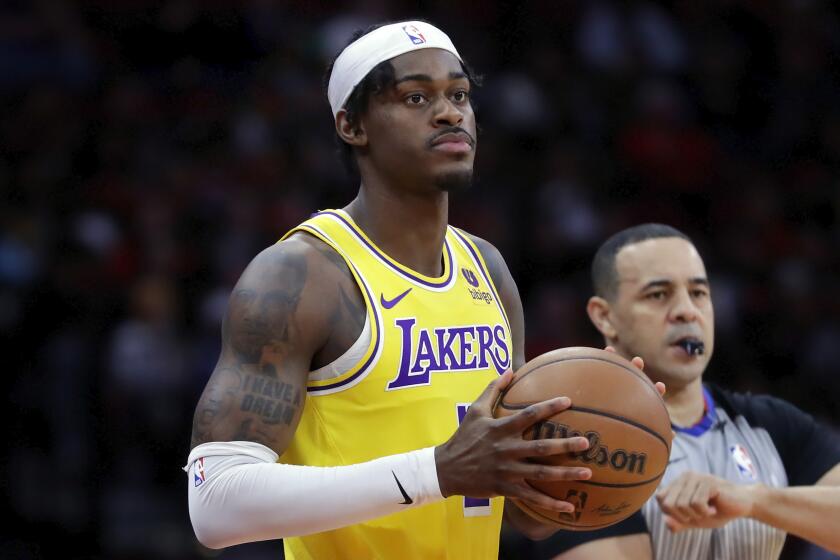Move to Bullpen Has Been Bonus for Eckersley, A’s
- Share via
It was strictly coincidence that Dennis Eckersley’s baseball career and lifestyle changed directions at the same time a little more than three years ago.
Neither Eckersley nor the Oakland Athletics had a clue that he would become the premier reliever in baseball. That happened almost by accident, shortly after he was acquired from the Chicago Cubs in the final week of spring training in 1987.
“We had a lot of starting pitchers who were missing turns,” said A’s Manager Tony La Russa. “He was a quality veteran and we were looking for depth. We had guys like (Joaquin) Andujar, (Moose) Haas, (Greg) Caderet and (Jose) Rijo who pitched good when they pitched, but they couldn’t always go out there.
“If one of them turned up unavailable, then Eck was going to go into the rotation,” said La Russa. “But then we ran into the same problem in the bullpen, when Jay Howell got hurt.”
Brilliant decisions sometimes evolve from such circumstances.
Unbeknownst to the A’s, or the Cubs, was that Eckersley, who had spent some time on the wild side, was making changes of his own. Personal problems caused him to take inventory of his life after the 1986 season, and he didn’t like the looks of his balance sheet.
“That was a screwed-up year,” said Eckersley, “but I’m not going to make excuses. I just didn’t pitch good.”
He had had arm problems in 1985 (when he was 11-7), and when he followed with a 6-11 season, the Cubs figured Eckersley was on the down side of his career.
“I can’t blame the Cubs for trading me -- they didn’t know the guy they were trading was sober,” said Eckersley, who went through an alcohol treatment program on his own during the off-season. “But it wasn’t the time for me to talk about it either.”
It wasn’t just because Eckersley didn’t want to admit to a problem. “I really didn’t know that much then. As time went on it came out and now it’s easy for me to talk about it.”
While looking for a starting pitcher to give them depth, the A’s came up with an unexpected bonus: a rejuvenated Eckersley. Still neither the right-hander nor La Russa envisioned him in the role of stopper.
“The biggest thing for me was accepting what it was,” said Eckersley. “At first it was a garbage role--sort of like a caddie. It was a blow to what was left of my ego.”
That changed with the injury to Howell, who subsequently was traded to the Dodgers after the 1987 season. In the last two years Eckersley has saved 78 games for the A’s, a remarkable statistic for a guy who spent his first dozen years in the big leagues as a front line starter.
Despite a seeming vulnerability to left-handed hitters, the transition undoubtedly has given Eckersley a career extension as well as a different approach to the game.
“I’m much more physical than I’ve ever been,” he said. “The truth is that my arm came back. If that didn’t happen, nothing would matter. When your arm is bad you work harder on it. If it isn’t, you don’t do anything.
“Working out is like therapy to me -- plus it’s like trying to stop the aging process,” said Eckersley, who at 35 is in the best shape of his life.
“He’s one of the best conditioned athletes around,” said La Russa. “He’s got a program that would bring young guys to their knees.”
Years ago the importance of such a program would have been lost on Eckersley, but no longer. “I want the game more than ever now,” he said. “It would be stupid to jeopardize it. And how good a shape do you have to be in to pitch one inning a game? And working out is a very positive thing; you expect good things to happen when you work hard.”
Eckersley gives Oriole Manager Frank Robinson credit for getting him to the big leagues sooner than expected, and La Russa for enhancing his success as a reliever. “Frank played an important role in my career,” said Eckersley, who came up in 1975 with the Indians, the first team managed by Robinson.
Robinson’s decision on Eckersley 15 years ago was not unlike the one he made on Gregg Olson a year ago. “He hadn’t done anything wrong and I couldn’t see any reason to send him down, even though he hadn’t pitched above Double A,” said Robinson. “We started him in the bullpen, but that was to protect him because he was only 20 years old. He was in the rotation by the middle of May.”
“A lot of people didn’t want me in the big leagues that soon,” said Eckersley, “but Frank believed in me. I was very fortunate to have him as manager at that point in my career.
“And a lot of my success now is due to the manager (La Russa). The way he uses me makes it easy.”
However, La Russa can’t help his ace get out the left-handed hitters that occasionally tormented him. “Part of the answer to that is I only have to go after them one time,” said Eckersley. “There comes a time in your career when it gets tough to get a guy out four times (in a game). I probably see as many left-handed hitters as right-handed, but I can still throw pretty hard for one inning.”
And if he didn’t always have control of himself, Eckersley always did have good control of his pitches. “I’m not talking about this kind of control,” said La Russa, holding his hands about six inches apart in the middle of an imaginary plate.
“His control is like this,” La Russa said for emphasis, indicating an area of about four inches--starting two inches from the edge of the plate to two inches outside the strike zone. “He has four different pitches with his fastball. He throws in, down and in, up and in, down and away, up and away--and they all have different movement.”
Though Eckersley admitted to having some nervousness when he took over his new role (“Anybody who says they don’t get nervous is crazy,” he said), pitching coach Dave Duncan says it’s no accident he has adapted to the role of stopper. “He’s been out there in the ninth inning as a starter a lot of times,” said Duncan. “He knows how to get the last out -- and anybody who can do that can be a good short reliever.”
Eckersley had his share of success in the past, but not as much appreciation. “I wouldn’t want anybody to have to go through what I went through,” he said, reflecting on his erratic past.
“But it’s difficult for anybody to really appreciate success unless they’ve had some problems along the way.”
So Dennis Eckersley keeps working out, slowing the aging process and extending a career that changed both dramatically and unexpectedly.
More to Read
Go beyond the scoreboard
Get the latest on L.A.'s teams in the daily Sports Report newsletter.
You may occasionally receive promotional content from the Los Angeles Times.










